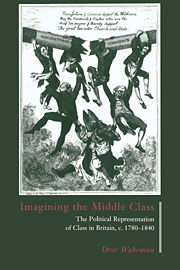Book contents
- Frontmatter
- Contents
- List of figures
- Acknowledgments
- 1 Imagining the ‘middle class’: an introduction
- PART I AGAINST THE TIDE
- Prelude to the 1790s: was the French Revolution a ‘bourgeois revolution’?
- 2 The uses of ‘middle-class’ language in the 1790s
- 3 Friends and foes of the ‘middle class’: the dialogic imagination
- 4 The political differentiation of social language: the debate on the triple assessment, 1797–1798
- Postlude to the 1790s: the uses of ‘bourgeois revolution’
- PART II THE TUG OF WAR
- PART III WITH THE TIDE
- Epilogue
- Index
2 - The uses of ‘middle-class’ language in the 1790s
Published online by Cambridge University Press: 08 January 2010
- Frontmatter
- Contents
- List of figures
- Acknowledgments
- 1 Imagining the ‘middle class’: an introduction
- PART I AGAINST THE TIDE
- Prelude to the 1790s: was the French Revolution a ‘bourgeois revolution’?
- 2 The uses of ‘middle-class’ language in the 1790s
- 3 Friends and foes of the ‘middle class’: the dialogic imagination
- 4 The political differentiation of social language: the debate on the triple assessment, 1797–1798
- Postlude to the 1790s: the uses of ‘bourgeois revolution’
- PART II THE TUG OF WAR
- PART III WITH THE TIDE
- Epilogue
- Index
Summary
POLITICAL MIDDLE AND SOCIAL MIDDLE IN OPPOSITION TO WAR! THE ‘MIDDLE-CLASS IDIOM’
The late events in France … have made one party here desperate and the other drunk. Many are become wild Republicans who a few months back were moderate Reformers, and numbers who six weeks ago were contented with plain, old-fashioned Toryism, have now worked themselves up into such apprehensions for the fate of Royalty as to be incapable of distinguishing between Reform and treason.
(George Tierney, October 1792)We live in times of violence and extremes.
(Charles James Fox, December 1793)The 1790s was indeed an extraordinary decade in British history, a decade in which almost everything became political, and politics became almost everything. It saw the unprecedented broadening of the range of possibilities believed to be attainable through political change; it saw the unprecedented broadening of the political public, eager to capture some of these possibilities. Whether enthusiastic or apprehensive, contemporaries were keenly aware of the novel nature of politics.
To say that the 1790s were ushered in by the French Revolution is of course not to imply that all or even most elements of the conflict in Britain were imported from across the Channel. But even if all the components of the contending political visions of this decade were British-made, the possibility of their concrete transformation from vision into reality – or the urgency of the need to prevent their imminent realization – owed their immediacy and potency to the French example. The revolution in France demonstrated that a fundamental change in the social and political order could be within reach: it converted fanciful fantasies into potentially workable blueprints.
- Type
- Chapter
- Information
- Imagining the Middle ClassThe Political Representation of Class in Britain, c.1780–1840, pp. 31 - 73Publisher: Cambridge University PressPrint publication year: 1995



